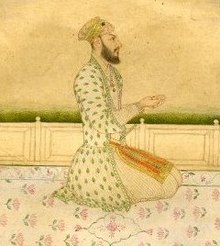| Bidar Bakht بیدار بخت | |||||
|---|---|---|---|---|---|
| Shahzada of the Mughal Empire Mirza[1] | |||||
 The Mughal prince Bidar Bakht | |||||
| Subahdar of Malwa | |||||
| Reign | 3 August 1704 – April 1706 | ||||
| Padishah | Aurangzeb | ||||
| Subahdar of Gujrat | |||||
| Reign | 1706 - 1707 | ||||
| Padishah | Aurangzeb | ||||
| Born | 4 August 1670 Agra, India | ||||
| Died | 20 June 1707 (aged 36) Jajau, near Agra, India | ||||
| Burial | |||||
| Spouses |
Shams-un-Nisa Begum (Puti Begum)
(m. 1686) | ||||
| Issue |
| ||||
| |||||
| House | House of Babur | ||||
| Dynasty | |||||
| Father | Azam Shah | ||||
| Mother | Jahanzeb Banu Begum | ||||
| Religion | Islam (Sunni Muslim) | ||||
Muhammad Bidar Bakht (Urdu: مُحمّد بیدار بخت; 4 August 1670 – 20 June 1707) was a Mughal prince. His father, Muhammad Azam Shah, briefly reigned as Mughal emperor in 1707. Bidar was noted for being a gallant, skilful and successful general and was regarded as the most able Mughal prince of his time.[2] He was the favourite grandson of Emperor Aurangzeb.[3]
From the age of seventeen, Bidar held senior military and administrative positions. One of his first actions involved storming Fort Sinsani, which was carried after fierce fighting and heavy losses. Aged nineteen, he led a Mughal force which defeated an invading Maratha army and pursued it for ten days. He was appointed viceroy of Aurangabad and then of Malwa alongside it. He constantly had to suppress uprisings and beat off incursions from neighbouring states. In 1707 Emperor Aurangzeb died and Bidar's father succeeded him; Bidar and his father were killed at the Battle of Jajau against Bidar's uncle.
- ^ Mughal title Mirza, the title of Mirza and not Khan or Padshah, which were the titles of the Mongol rulers.
- ^ Richards, J.F. (1995). Mughal empire (Transferred to digital print. ed.). Cambridge University Press. p. 272. ISBN 9780521566032.
- ^ Cite error: The named reference
Sarkar1933was invoked but never defined (see the help page).